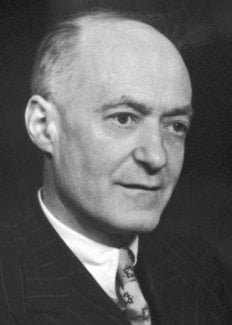Sir Cyril Hinshelwood
Biographical

Sir Cyril Norman Hinshelwood was born in London on June 19, 1897. He was educated at Westminster City School and Oxford University where he gained Master of Arts and Doctor of Science degrees. He held successive fellowships at Balliol, Trinity, and Exeter Colleges; he was tutor of Trinity College from 1921 to 1937 and since 1937 he has been Dr. Lee’s Professor of Chemistry, University of Oxford. He is a delegate of the Clarendon Press and he has served as a member of several Advisory Councils on scientific matters to the British Government. He was elected Fellow of the Royal Society in 1929, serving as Foreign Secretary from 1950 to 1955, and as President from 1955 to 1960. He was knighted in 1948 and appointed to the Order of Merit in 1960.
His early studies of molecular kinetics led to the publication of Thermodynamics for Students of Chemistry and The Kinetics of Chemical Change in 1926, the latest (fourth) edition of the latter appearing in 1940, and he subsequently worked on chemical changes in the bacterial cell, producing physicochemical explanations for the biological responses of bacteria to changes in environment. His findings proved to be of great importance in later research work on antibiotics and therapeutic agents, and his book on the topic The Chemical Kinetics of the Bacterial Cell was published in 1946. He has contributed a great number of original papers and reviews to journals of learned societies and to other scientific periodicals, and his latest book, The Structure of Physical Chemistry appeared in 1951.
Sir Cyril was President of the Chemical Society from 1946 to 1948, and President of the Faraday Society from 1961 to 1962, and included amongst the many awards he has gained are Lavoisier Medal, Société Chimique de France, 1935; Davy Medal, Royal Society, 1943; Royal Medal, 1947; Longstaff Medal, Chemical Society, 1948; Guldberg Medal, Oslo University, 1952; Faraday Medal, 1953; Avogadro Medal, Accademia dei Lincei, Rome, 1956; and Leverhulme Medal, Royal Society, 1960.
Honorary degrees conferred on Sir Cyril include Doctor of Civil Law (Oxford) and the Doctor of Science degrees of Bristol, Cambridge, Dublin, Hull, Leeds, London, Sheffield, Wales, and Ottawa Universities. He holds honorary memberships of the major scientific societies of many countries.
Sir Cyril is unmarried. He is fluent in many languages and his main hobbies are painting, collecting Chinese pottery, and foreign literature.
This autobiography/biography was written at the time of the award and first published in the book series Les Prix Nobel. It was later edited and republished in Nobel Lectures. To cite this document, always state the source as shown above.
Sir Cyril Hinshelwood died on October 9, 1967.
Nobel Prizes and laureates
Six prizes were awarded for achievements that have conferred the greatest benefit to humankind. The 14 laureates' work and discoveries range from quantum tunnelling to promoting democratic rights.
See them all presented here.
